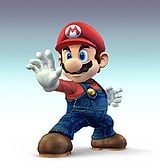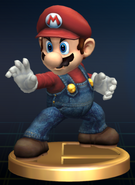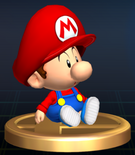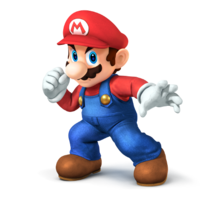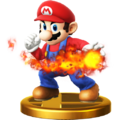Mario: Difference between revisions
(Undid edit by Baconman89: April Fools Day is over, my friend.) |
TheNuttyOne (talk | contribs) No edit summary |
||
| Line 4: | Line 4: | ||
{{Infobox Character General | {{Infobox Character General | ||
|name = Mario | |name = Mario | ||
|image = [[File:Mario | |image = [[File:Mario MP10.png|250px]] | ||
|caption = [[File:MarioSymbol.png|50px]] | |caption = [[File:MarioSymbol.png|50px]] | ||
Official artwork of Mario from ''{{s|mariowiki| | Official artwork of Mario from ''{{s|mariowiki|Mario Party 10}}''. | ||
|firstgame = ''{{b|Donkey Kong|game}}'' (1981) | |firstgame = ''{{b|Donkey Kong|game}}'' (1981) | ||
|lastappearance=''{{s|mariowiki|Mario Party 10}}'' (2015) | |lastappearance=''{{s|mariowiki|Mario Party 10}}'' (2015) | ||
Revision as of 17:23, April 2, 2015
- For fighter info, see Mario (SSB), Mario (SSBM), Mario (SSBB), and Mario (SSB4).
- For the universe, see Mario (universe).
| Mario | |
|---|---|
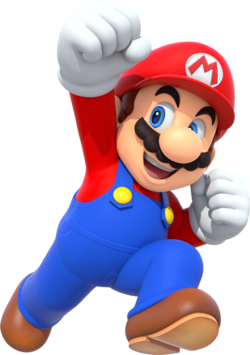 File:MarioSymbol.png Official artwork of Mario from Mario Party 10. | |
| Universe | Mario |
| Debut | Donkey Kong (1981) |
| Smash Bros. appearances | SSB Melee Brawl SSB4 Ultimate |
| Most recent non-Smash appearance | Mario Party 10 (2015) |
| Console/platform of origin | Arcade |
| Species | Human |
| Gender | Male |
| Place of origin | Mushroom Kingdom |
| Created by | Shigeru Miyamoto |
| Designed by | Shigeru Miyamoto (Donkey Kong) Yoichi Kotabe (Super Mario Bros. series) Shigefumi Hino (Super Mario World) |
| Voice actor | Charles Martinet |
| Article on Super Mario Wiki | Mario |
Mario (マリオ, Mario) is Nintendo's most popular character and is the long-running eponymous hero in the extensive Mario series of video games. Unanimously viewed as the mascot of Nintendo, Mario is said to be the most well-known and most popular video game character in the world, having appeared in over 200 video games, and has been described as a "Video Game Legend". Mario appears as a main playable fighter in all four Super Smash Bros. games. Mario was also the rival to Sega's Sonic the Hedgehog in the 1990s. His voice actor in all four Super Smash Bros. games is Charles Martinet, who also voices Luigi, Wario, Waluigi, and Toadsworth, all of whom are other characters from his series.
Character description
Years before video gaming exploded into mainstream popularity, prominent game designer Shigeru Miyamoto designed the original arcade game Donkey Kong in 1981, debuting Mario as the main playable character and Donkey Kong as his in-game nemesis. Mario's character design was heavily influenced by the extreme technical limitations of digital games at the time; as a small batch of pixels, Mario was given a mustache under his big nose to show he had a face, and suspenders with his shirt to show a distinction between his arms and body. In this game Mario was originally known as "Jumpman" in the initial Japanese release, and he was portrayed as a carpenter whose girlfriend Pauline (originally "Lady" in Japan) was held captive by the colossal ape Donkey Kong, and must jump his way over the barrels and flames DK throws at him to rescue Pauline.
After his initial appearance in this pioneering game, Mario, under his proper name for the first time in Japan, was introduced in the sequel, Donkey Kong Junior, and identified as of Italian ethnicity by Nintendo's president Hiroshi Yamauchi. Mario was named as such due to his comical resemblance to Nintendo of America's landlord Mario Segale. Then Mario and his newly introduced brother Luigi starred in the 1983 arcade game Mario Bros. as plumbers.
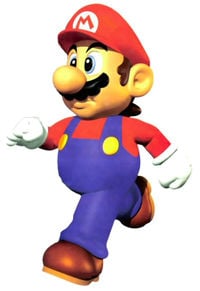
Miyamoto's next game was the world-famous Super Mario Bros. for the Famicom/NES, the game that single-handedly brought video gaming into the mainstream and made Nintendo a major company in a now-major industry [1]. Many iconic aspects of Mario and his franchise were established: Mario and Luigi are no longer plumbers, now they are heroes and now live in the magical Mushroom Kingdom ruled under Princess "Peach" Toadstool and her mushroom-retaining Toad servants, and the Koopa king Bowser kidnaps the princess for Mario to rescue. Mario must bound across side-scrolling platform stages to rescue her, jumping on the heads of common enemies like Goombas and Koopa Troopas to defeat them. He starts out tiny but can grow to double his size if he grabs a Super Mushroom powerup, gain the ability to shoot out fireballs by grabbing a Fire Flower, and turn invincible for a short period of time by grabbing a Super Star. Super Mario Bros. became a franchise with these elements lasered into video game iconography, consistent in future games in the Mario series.
For over 20 years afterward, Mario would star in many games for various Nintendo systems. Mario and his accompanying franchise can be viewed as Nintendo's thematic tileset with which to create games of a whimsical, colorful, and light-hearted nature. Mario himself is meant to be a character anyone can enjoy playing as, and can fit well as a protagonist figure and/or main balanced character in many genres of games. To this end, he is not portrayed as a character that undergoes development like what players would see with a character in an epic RPG's story. He is, in fact, rarely depicted speaking coherent English sentences. In contemporary Mario games, his high-pitched Italian voice, provided by Charles Martinet, is used mainly for grunts and yells and the occasional catchphrase, such as "Mama-mia!", "It's-a me, Mario!", "Let's-a-go!". As a semi-silent, optimistic protagonist, Mario is inherently easy for players of his various games to appreciate, and he is usually the most balanced selectable character in any game he appears in, including the Smash games.
Genres of games in which Mario appears in a playable role include the traditional 2D side-scrolling platformer, including various sequels to Super Mario Bros., the famed Super NES launch platformer Super Mario World, which introduced Yoshi as a mount of sorts for Mario, and the DS homage to these games in the form of New Super Mario Bros.; 3D platforming adventures such as the especially seminal Super Mario 64 adventure game launching for the Nintendo 64, which is one of the most influential and best-reviewed games ever, followed up by Super Mario Sunshine for GameCube and Super Mario Galaxy for Wii; the Mario Kart series of power-up and obstacle course-based racing games; a long-running series of multiplayer-based party games named Mario Party; various series of Mario-themed sports titles such as Mario Golf and Mario Tennis; hands-on RPGs such as the Paper Mario and Mario & Luigi series; and a puzzle game named Dr. Mario, where Mario in the garb of a medicine man throws pills into a bottle to combat viruses (his persona in this game is also a playable character in Super Smash Bros. Melee, see Dr. Mario). A baby version of Mario, who is often treated as a separate character, has also appeared in many of these games. Mario made his first appearance in a fighting game in 1999's Super Smash Bros., and has appeared traditionally in all subsequent installments of that series.
In Super Smash Bros.
As a playable character
Mario makes his first appearance in a fighting game in the original Super Smash Bros. as a starting playable character. He is based on his appearance from the Nintendo 64 era. Like in many other games, he is touted as the most balanced character with no real strengths or weaknesses; therefore, new players of the game are encouraged to play as him first. In the competitive meta-game, he can combo well but lacks a multipurpose finisher. His lack of outstanding strengths make him only a high tier fighter, not top-tier, placing him at 5th in B tier on the SSB tier list. His neutral special move shoots a moderately fast, bouncing, low-damage Fireball in the direction he is facing; his up special move is an uppercut third-jump called the Super Jump Punch which can hit multiple times for minor damage (and coins briefly appear with each hit); and his down special move is the Mario Tornado, where he whirls his body to damage foes around him, before throwing them up into the air.
Mario's in-game character description reads as follows:
- Mario
- Although best known as the mustachioed plumber who battles the Turtle Tribe with his distinct jumping action, this internationally-famous hero has also acted as a referee, a driver, and even a doctor! He's been linked to Princess Peach of Mushroom Kingdom for years, but to this day their true relationship remains a mystery.
- Works:
- Super Mario Bros. (NES),
- Super Mario Kart (SNES),
- Mario Kart 64 (Nintendo 64)
In Super Smash Bros. Melee
As a playable character
As a starting playable character in this game, Mario is touted as the most balanced character of the game's character roster, much like his appearances in other games, with no real strengths but no outstanding weaknesses either; therefore, new players of the game are encouraged to play as him first. His appearance is still based off his appearance from the Nintendo 64 era. His new side special move is whipping out his yellow Cape from Super Mario World to turn the enemy in front of him facing the opposite direction, which is useful for diverting enemy attack and recovery. In the competitive meta-game, he can easily combo opponents, has a long wavedash like Luigi, and is good at juggling opponents, but it is his lack of a reliable finisher that causes him to remain in the game's Middle Tier; his Smash attacks do not even feature all that much knockback and range, impairing his ability to fight like a character like Marth. He also has low grab range and bad recovery. It is notable that in both versions, Mario has great combo potential coupled with the lack of a good finisher.
Trophies
In addition to the standard three trophies which playable characters in Melee get - a standard trophy won by defeating Classic Mode, and "Smash Red" and "Smash Blue" trophies won by beating the Adventure and All-Star modes, respectively - Mario, as Nintendo's mascot, also features on a number of other trophies as Dr. Mario (see Dr. Mario (SSBM)), Raccoon Mario, Metal Mario, Paper Mario, and Mario and Yoshi. The last trophy in particular is especially notable for being one of two "gift trophies" never found during normal play, only available at all in the NTSC version of Melee, and then only at special Japanese events or by using a hacking device. There is also a trophy for Baby Mario, a baby version of Mario that mostly appears in Yoshi games.
Mario's Classic Mode trophy, and his Baby Mario trophy, read as follows:
Mario
Known worldwide as Mr. Nintendo, Mario uses his incredible jumping ability to thwart the evil Bowser time after time. While he's best known as a hero, Mario has played many roles, including racer, doctor, golfer, and villain. His tastes have changed over 20 years of gaming; he long ago swapped the colors of his shirt and overalls.
- Donkey Kong, Arcade 1981
Baby Mario
Long ago, when the stork was carrying Baby Mario and Baby Luigi to the Mario household, the stork was ambushed, causing Baby Mario to tumble onto Yoshi's Island. This marked the beginning of the Yoshi's adventure to deliver Baby Mario to his parents. Since then, Baby Mario's been spotted on golf courses and tennis courts.
- Super Mario World 2: Yoshi's Island (10/95)(SNES)
In Super Smash Bros. Brawl
As a playable character
Mario was again a playable character in Super Smash Bros. Brawl, ostensibly intended to be the most balanced character. His appearance is based on his current appearance seen in the later Mario games. He has undergone a visual redesign, like his Fireball, which looks more realistic, but he is essentially the same fighter as he appeared in Melee, retaining all of his moves (although his former down special attack, the Mario Tornado, has become his down aerial attack, its former slot taken by F.L.U.D.D.). Like all of the game's other returning characters, he incorporates a Final Smash attack which can be used once he collects a Smash Ball. His Final Smash is the Mario Finale, where he projects a colossal, intertwining fireball to engulf all opponents in his direction. The Mario Finale extends to both well above and well below Mario's position, so Smash Bros. DOJO!! recommends that he is standing on a moderately elevated platform for maximum effect.
Mario is ranked 31st on the current tier list in F tier. While his tournament results have been surprisingly high, his rather standard abilities are outshined by the abilities of many other characters.
Trophies
Mario has a trophy that is awarded each time Classic mode is completed with him on any difficulty. The player can get a Mario Finale Trophy each time the player completes All-Star mode with Mario. See Mario Finale for the trophy description of Mario's Final Smash.
Mario
A familiar overall-clad figure who is Nintendo's flagship character. His courage and jumping ability have seen him through countless adventures. He's a multi-talented plumber with the knowledge of a physician, a top-notch golfer, and a veteran tennis umpire. Is his jumping prowess a boon from his girder-climbing days?
Baby Mario
Mario as a baby...a crybaby at that. Even then he wore overalls, and we can see the trademark red hat at this young age.[1] Everyone's favorite hero was riding Yoshi and adventuring from his youngest days, and even as a baby it's clear that Mario had quite the nose.
In Super Smash Bros. 4
Mario was confirmed as a playable character during the E3 2013 Nintendo Direct. His appearance is based off recent Mario games, especially Super Mario 3D World and Mario Kart 8.
Mario was buffed from Brawl to Smash 4. His power was buffed, and he is faster as well.
Trophies
Mario
As iconic as iconic gets, this gaming celebrity is known for saving the world from Bowser. He's got amazing jumping skills and makes use of a wide range of transformations. In his free time, he plays too many sports to count. In Smash Bros., he's a well-rounded fighter you can rely on. Say it with me: "It's-a me, Mario!"
It's-a him! Maaario! Whether he's wearing one of his special outfits or just his normal blue dungarees, this running, jumping, Bowser-bashing, princess-saving hero is an all-round superstar. And in this game, he's got enough tricks up his sleeve to deal with anything. If you don't know which fighter to pick, Mario's a solid choice.
- Appears In
: Donkey Kong Classics 09/1988
: Super Mario Bros. 10/1985
Mario (Alt.)
Super Jump Punch is an up-special move that lets you leap high into the air, carrying any fighters you strike along with you. You'll be invincible for a moment after you launch this attack. The default side-special move, Cape, will flip a fighter around. Keep a foe from returning with this move!
Mario's Super Jump Punch takes you high into the air, and if you catch an opponent with it, they'll go up with you. Try to hit them at the very start of the move to do the most damage. His default side special, Cape, can flip fighters around. If you're really crafty, you can even use it to keep someone from getting back on the stage!
- Appears In
: Donkey Kong Classics 09/1988
: Super Mario Bros. 10/1985
- MarioAllStarTrophy3DS.png
Alt. (3DS)
- MarioAllStarTrophyWiiU.png
Alt. (Wii U)
Trivia
- Despite being a character primarily known for his jumping abilities outside Super Smash Bros., Mario has had below average jumping abilities in each Smash game to date.
- Prior to Super Smash Bros. 4, Mario has had at least one appearance alongside the other third party characters.
- He appeared with Pac-Man in the Mario Kart Arcade series and provided commentary in Pac-Man Vs..
- He appeared with Sonic in the Mario & Sonic games.
- He appeared with Mega Man in the Super Mario: Die Bescherung comic.
- Mario also made a cameo appearance in the form of a figurine on Otacon's desk in Metal Gear Solid: The Twin Snakes.
- Mario and Marth are the only characters to have two different characters as full clones, Mario's being Luigi in Super Smash Bros. and Dr. Mario in Melee and Smash 4.
- Mario has been one of the first characters, if not the first character, to be confirmed as a playable character for each game from Melee onward.
Notes
- ^ The NTSC version of the Baby Mario trophy claimed that "he lacks overalls", even though the trophy itself depicts him with his trademark red/blue overalls. This was corrected for the PAL release of Brawl. [The full second sentence of the NTSC version read: "Although he lacks overalls, we can see the trademark red hat even at this young age."]
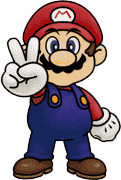
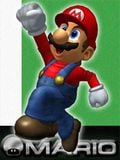
![Mario [Classic Mode] trophy](https://ssb.wiki.gallery/images/thumb/3/32/Mario_Trophy_Melee.png/77px-Mario_Trophy_Melee.png)
![Mario [Smash, Adventure Mode] trophy](https://ssb.wiki.gallery/images/thumb/c/c3/Mario_Trophy_%28Smash%29.png/82px-Mario_Trophy_%28Smash%29.png)
![Mario [Smash, All-Star Mode] trophy](https://ssb.wiki.gallery/images/thumb/7/75/Mario_Trophy_%28Smash_2%29.png/93px-Mario_Trophy_%28Smash_2%29.png)





